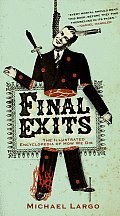Author2Author: Michael Largo & Lisa Cullen
Michael Largo, the author of Final Exits, an “illustrated encyclopedia of how we die,” was psyched when he found out I wanted to pair him up for an Author2Author with Lisa Cullen to talk about her new book, Remember Me, a “lively tour of the new American way of death.” You see, two decades, when Cullen’s doctor warned him that he’d probably be dead in six months if he kept up his way of life, Cullen responded by pre-ordering his tombstone. When he didn’t die, he recalls, “the monument company threatened to grind my name off and sell it to someone else if I didn’t pick it up. So I persuaded six friends to help me carry this monstrously awkward stone up to my filth floor walk-up apartment on St. Marks Place. This marker in my living room turned out to be the wildest 400 pound granite Post-It note money could buy. In fact, the heavy reality of it got me over the immortality mindset of my twenties and was ultimately a wake-up to modify many a harmful lifestyle.”
 Michael Largo: Lifestyle, as I’ve discovered, is the real cause for nearly 50% of all deaths. How do we actually die? That is the question I wanted to know. Of course, the Center for Disease Control (CDC) puts out the top ten causes each year, but that is such a tablet of saccharin in the sea of data, some of which you’ll find in Final Exits. While researching your book, did you find cause of death to be influential in burial choices?
Michael Largo: Lifestyle, as I’ve discovered, is the real cause for nearly 50% of all deaths. How do we actually die? That is the question I wanted to know. Of course, the Center for Disease Control (CDC) puts out the top ten causes each year, but that is such a tablet of saccharin in the sea of data, some of which you’ll find in Final Exits. While researching your book, did you find cause of death to be influential in burial choices?
Lisa Cullen: I thought I ought to start by letting you know that Final Exits has been selected for admission to my family’s library of bathroom books. Its quick, funny, bizarre, bite-size reads makes the book perfect for the smallest room of the house. I apologize if you had grander ambitions, but, to my family, this placement is in fact the highest honor… I must however admit I question your moorings. What kind of person knows that more than 500 people died between 1999 and 2003 from economy-class syndrome? Or that halitosis can lead to cancer? Or that “in 1987, Texan Walter Mitchell killed his wife because she was about to say the words ‘New Jersey'”? Your tale about keeping a tombstone in your apartment only deepens my suspicions, friend.
But you pose a serious and interesting question. My first instinct was to answer no, that the cause of death did not seem to reflect upon the mode of burial among the people I profiled in my book who chose unusual and personal send-offs. After some reflection, however, I thought of the mother of three with cancer who chose a “green” burial in a nature preserve in South Carolina. I did not get to interview her before her passing, but it occurs to me that her unimaginable pain must have been eased somewhat by knowing she had chosen to go as one with nature. I think it would for me. And in the case of the Port Authority worker who died on 9/11, his empty casket was held in the mausoleum until his remains could be found.
Do you think the fact that a book like yours can exist means we Americans perceive death differently today? In other words, does our generation see humor in death? And if so, why now? The world just isn’t so funny these days.
 Michael Largo: To get someone’s attention, especially about death, as you aptly put, in these “unfunny times” is more than a bit competitive and a daunting paddle against the digital stream of more glitzier distractions. Historically, the subject was not the two-step back conversation stopper it could be today, if not delivered with some touch of humor. This cultural shift can be attributed to the assent of the boomer generation you reported on in Remember Me. Youthful immortality became a pretty cool concept and denial of dying a marketing norm. Today, death is a serious inconvenience and wrecks havoc on the day planner. The “frozen dead guy” extravaganza in your book is death as a sitcom, or the cremated remains turned into a diamond is the new Pet Rock of the times.
Michael Largo: To get someone’s attention, especially about death, as you aptly put, in these “unfunny times” is more than a bit competitive and a daunting paddle against the digital stream of more glitzier distractions. Historically, the subject was not the two-step back conversation stopper it could be today, if not delivered with some touch of humor. This cultural shift can be attributed to the assent of the boomer generation you reported on in Remember Me. Youthful immortality became a pretty cool concept and denial of dying a marketing norm. Today, death is a serious inconvenience and wrecks havoc on the day planner. The “frozen dead guy” extravaganza in your book is death as a sitcom, or the cremated remains turned into a diamond is the new Pet Rock of the times.
To answer your question—”Does our generation see humor in death?”—I say, hell no. To the majority of Americans, death sucks. I personally don’t want to checkout until I get a chance to see everyone zooming around in flying cars. But the only way I found to fill some seats in the audience is to tell of the things that kill us in anecdotes, take the dry statistics and serve them on a wry platter. Death has always been the greatest of stories, and now, when someone turns 50 every seven seconds, it’s a subject getting more and more notice. So, I think death is seriously not funny, but writing funny is the only way to get serious attention when it comes to a book about death for the general reader. I, for one, was shocked by the number of people who died in certain ways, the true causes not previously revealed in other than the double-speak industries, hospitals, and those duly pronouncing the dead wanted us to know: Many seemingly had self-interest in how the numbers were tallied. In your book, especially as you described the going-ons at the Funeral Director’s Convention, death was good for business.
In Final Exits I want the reader to see how many of the things that end our days prematurely can be avoided—and certainly not good for the business of living. What is the one thing you hoped readers would take away after reading Remember Me?
Lisa Cullen: I wonder if Beatrice readers figured they were in for the scatalogical element of this death-themed Author2Author… Anyway, I guess I hoped that readers would see that remembering a loved one in a unique, unconventional, alternative way is not only possible but may even yield a deeper, more profound event. When I’d tell people about the book, those who didn’t back off with a frozen smile invariably cackled or wrinkled their noses at some of my anecdotes, such as the lady who has her husband’s ashes turned into a diamond or the woman in Salt Lake City who means to have her body mummified.
I admit I started off on my journey with the same skepticism. How can you approach a lobster-shaped casket with a straight face? But as I spent time with the families, funeral directors and end-trepreneurs who espoused these fresh new ways to remember their dead, my own concept of what was proper or right completely evolved.
How did you research your book? And how did people react when you told them about it?
Michael Largo: If you need a way to appreciate the grandeur and inexorable nature of human resiliency, you could do no worse than to consider the surprising numbers found in death statistics. The layers of death records when sliced away exposed sediment-like layers of human life, showing how society’s idea of death and the value placed on life changed dramatically from colonial times to the present.
I worked under the assumption that every life should count for something, and that those that went before, in the very least, could help others live longer. Collecting the numbers from over fifty government agencies, and countless archives, was not as easy as I first thought. There’s still no standard in filling out death certificates; local, state and national recording agencies are not wired together, and many times the attendant completing the required form at the bedside or at the morgue have a limited history of the person being duly pronounced. I found more truth in the secondary causes of death written on these documents than in the primary, which are the statistics most often cited. This process took over ten years and I’m still going at it—unfortunately, it seems our ingenuity and technology are figuring out new ways for us to become deceased.
As far as people’s reactions while writing Final Exits, or the book on the same subject I am currently at work on, there’s always the puzzled, “Oh, really?” In fact, as you noted in Remember Me, I can’t think of another subject that makes you appreciate life more. And besides, wouldn’t everyone want to know if it’s better to take the escalator, the elevator or the stairs? How many people die from laughing, from crying, on their wedding day, or even at a funeral, I think, are questions that even non-scatological minds would want to know.
Did writing Remember Me give you a new perspective on life, and do you plan on approaching the subject again?
Lisa Cullen: Michael, I see what you mean; the scope and variety of death statistics and anecdotes in your book ought to give its author as well as its reader an awed appreciation of life. With so many ways to die, it seems a miracle any of us manage to live out our years without being offed by Lyme disease or vigilantes or ill-advised attempts at competitive eating.
Me, I found that my so-called lively tour of death did make me think about what it means to be alive. There were a lot of nights I could have done without those thoughts—nights I spent crouched over my baby’s crib, stroking her hair as I watched her breathe. I can’t tell you I came away with profound epiphanies; I no more can tell you the meaning of life than can my basset hound. But it did make me think. Searching for the fun in funerals, as I write in the book, I found the if in life.
Unlike you, however, I lack the fortitude to continue the tour of death any further. I’m thinking about a doing a 180 for my next book and reporting on love.
16 October 2006 | author2author |

 Our Endless and Proper Work is my new book with Belt Publishing about starting (and sticking to) a productive writing practice.
Our Endless and Proper Work is my new book with Belt Publishing about starting (and sticking to) a productive writing practice. 
